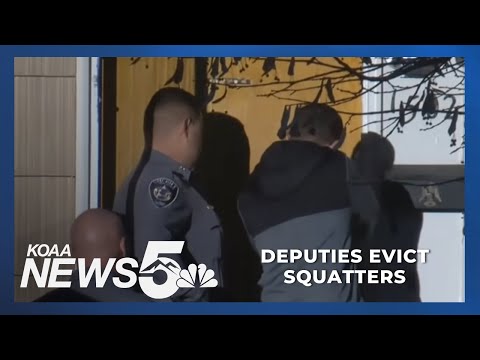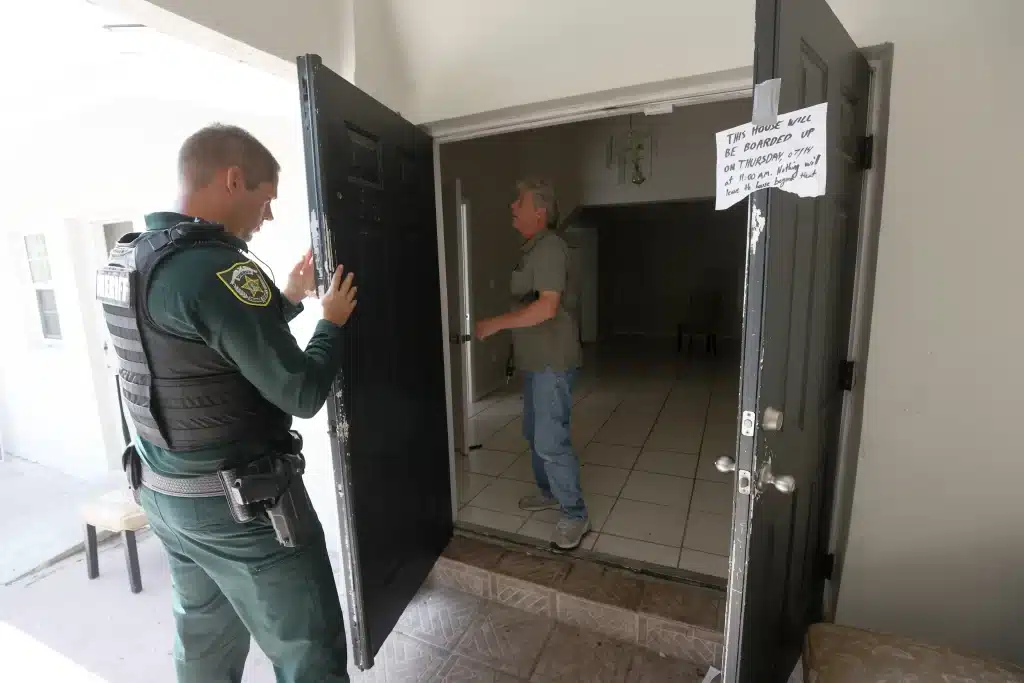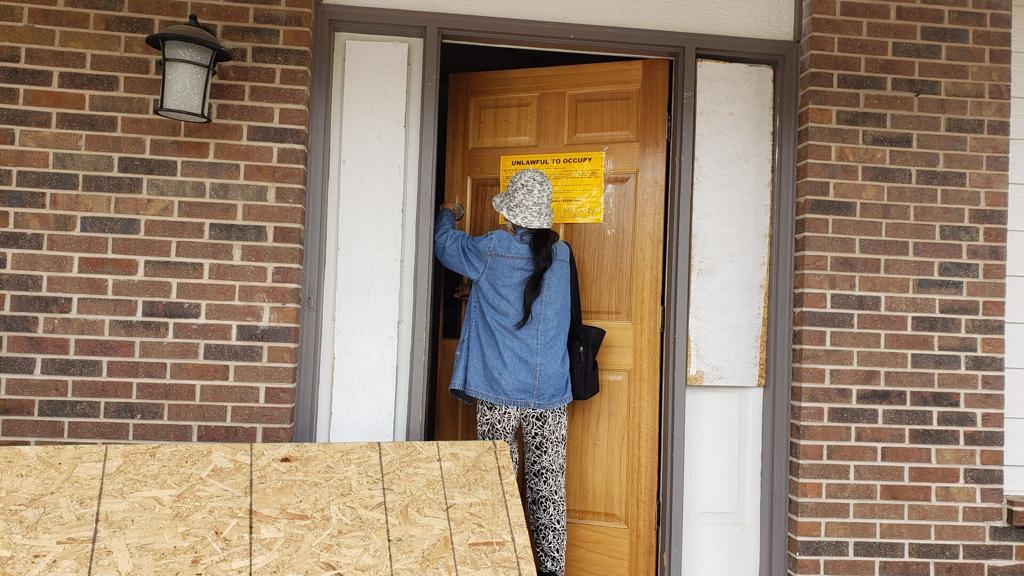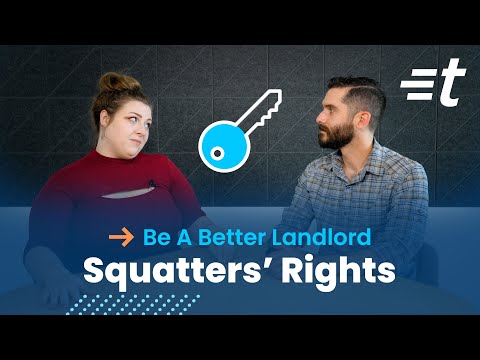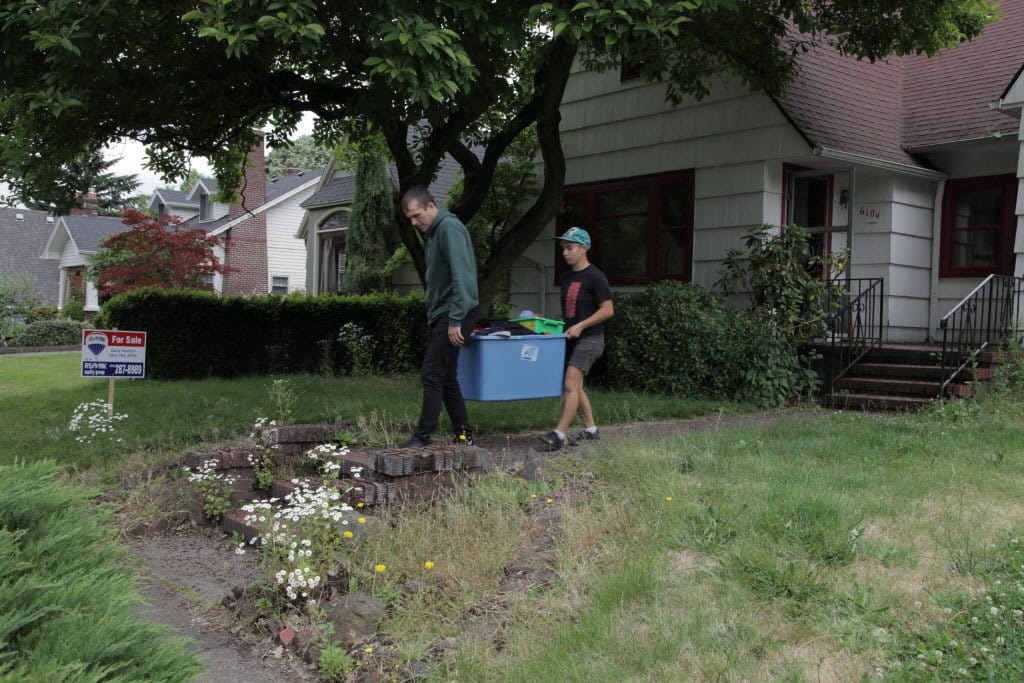How To Evict A Squatter in Colorado?
Are you dealing with a squatter in your Colorado property? Squatting can be a frustrating and complex issue for homeowners, but don’t worry, we’re here to help. Did you know that squatting is not legal in Colorado?
In this blog article, we will guide you through the process of evicting a squatter and provide tips on preventing and protecting against future incidents. Get ready for valuable information that will empower you to take decisive action.
Key Takeaways
- Squatting is not legal in Colorado.
- Squatters are individuals who unlawfully occupy a property without the owner’s permission.
- To evict a squatter, homeowners should call the police, serve an eviction letter, file a civil claim, and obtain a court-ordered eviction.
- Squatters do not have legal rights to occupy someone else’s property without permission. Homeowners have the right to protect their property and remove squatters through proper legal procedures.
- Landlords can prevent squatters by conducting thorough tenant screening. regularly inspecting properties, maintaining security measures, and promptly addressing any signs of unauthorized occupation.
Let’s jump right in and find out how to evict a squatter in Colorado.
“Within hours after submitting my home information on their site I got a call back and an offer to my house. I ended up selling the house 2 weeks later. Thanks for taking the time to listen to my concerns and guiding me through this stressful time in my life.”
Explanation of squatters and their impact
Squatters are people who live in a place that they do not own or rent. They can be a big problem for homeowners in Colorado. Squatters can impact your life when they take over your property.
They use it without asking you or paying you rent. This is not fair to the person who truly owns the land or home. It can also hurt the value of homes around it, making them less worth sell or rent out.
Squatting isn’t legal yet these unwanted guests have some rights too, which makes kicking them out harder.
Squatters Rights in Colorado
Squatters in Colorado are individuals who unlawfully occupy a property without the owner’s permission, and they may have certain rights under Colorado law.
Definition of squatters
Squatters are people who live in a place without the right to do so. They can move into empty houses or buildings and stay there for free. In Colorado, squatters might be seen as trespassers.
This is because they don’t have any legal claim to the property where they are living.
However, if squatters stay on a property for many years, they may get rights to it. This is called “adverse possession”. For this rule to apply, squatters need to live on the place openly and all the time for 18 years.
Only then can they say that the space is theirs legally.
What rights they have
Squatters in Colorado do not have legal rights to occupy someone else’s property without permission. In fact, squatting is considered trespassing and is not protected by “squatter’s rights” in the state.
If you’re a homeowner dealing with squatters, it’s important to know that you have the right to evict them following the proper legal process. This involves calling the police, serving an eviction letter, filing a civil claim, and obtaining a court-ordered eviction.
By understanding your rights as a homeowner and following these steps, you can effectively remove squatters from your property.
“Fantastic Company, they were there to answer my many questions and they work quickly to resolve some lien issues that came up before closing. I will continue to use them in the future and also refer my friends and family to them.“
How they can claim squatter’s rights
To claim squatter’s rights in Colorado, individuals must meet the legal requirements for adverse possession. This means they need to continuously and openly possess a property for 18 years without interruption.
During this time, they must treat the property as their own and pay any property taxes due. If these conditions are met, squatters can potentially claim ownership of the property through adverse possession laws in Colorado.
However, it’s important to note that squatting itself is not protected by “squatter’s rights” in Colorado, and there are specific legal processes that landlords can follow to evict squatters from their properties.
Steps to Evict a Squatter
To evict a squatter in Colorado, there are several steps you need to follow. From calling the police to obtaining a court-ordered eviction, these actions will help you reclaim your property and protect your rights.
Read on to learn more about the effective methods for removing squatters in Colorado from your property.
Call the police
If you find squatters on your property in Colorado, one of the first steps you should take is to call the police. Squatting is not legal in Colorado, and it is considered trespassing.
The police can help document the situation and assist with removing the squatters from your property. It’s important to report this issue promptly so that law enforcement can take appropriate action.
Remember, calling the police is an essential step in the eviction process for squatters in Colorado. They can provide guidance on how to handle the situation legally and ensure a smooth resolution.
Serve an eviction Notice Letter
To begin the process of evicting a squatter in Colorado, you will need to serve them an eviction letter. This letter formally notifies the squatter that they are illegally occupying your property and that legal action will be taken if they do not leave within a specific timeframe.
It is important to include details such as the date, the reason for eviction, and any relevant laws or regulations. By serving an eviction letter, you are establishing clear communication with the squatter and providing them with notice of their impending removal from your property.
File a civil claim
To evict a squatter in Colorado, you will need to file a civil claim. This means taking legal action against the squatter to regain control of your property.
Filing a civil claim involves going through the court system and presenting evidence of your ownership and the illegal occupation of your property by the squatters.
It is an important step in the eviction process and can help you obtain a court-ordered eviction to remove the squatters from your property legally.
Obtain a court-ordered eviction
To remove squatters from your property in Colorado, you will need to obtain a court-ordered eviction. This is an important step in the process and ensures that the authorities can legally enforce the removal of the squatters.
To do this, you will need to file a civil claim against the squatters and provide evidence of their unauthorized occupation of your property. The court will then review your case and make a decision regarding the eviction.
It’s important to follow all legal procedures and gather supporting documentation to strengthen your case for a successful court-ordered eviction.
Resources For Selling Your Home Fast
- How Much Will An Investor Pay To Buy My House
- How To Evict A Squatter in Colorado
- is it a Good Idea to Sell My House Now or Wait
- How To Sell a House in 2 Weeks
- Why isn't My Home Selling Fast
- How do I get my house ready to sell in 30 days
- How Can I Market My House To Sell Fast in Denver
- How To Sell Your House For Cash Fast in Denver
- Where Can I Sell My House Fast For Cash in Denver
- We Buy Houses in Any Condition in Colorado
- What’s The Fastest You Can Sell a House
- I Want To Sell My House as is Fast Online
- How To Sell My House Fast For Cash
- 5 Tips To Sell Your House as is Fast
- How To Sell Your Own House in Colorado Without An Agent
- How To Sell A Fixer Upper House Fast
- How To Sell A House Fast in Denver
- How To Sell My House Fast in Denver
- How To Sell My House Quickly For a Good Price
- What is a Cash Offer on a House
- How To Sell a House By Owner in Colorado
Preventing and Protecting Against Squatters
To prevent and protect against squatters, landlords should take proactive measures such as; conducting thorough tenant screening, regularly inspecting properties, maintaining a visible presence, promptly addressing any signs of unauthorized occupation, securing vacant properties, installing security systems and cameras, and documenting all interactions with tenants to establish a paper trail in case legal action becomes necessary.
Tips for preventing squatters as a landlord
To prevent squatters as a landlord in Colorado, there are some important steps you can take. First, make sure your property is well-maintained and secure. Regularly inspect the property to identify any potential vulnerabilities or signs of unauthorized entry.
It’s also essential to keep good records of your ownership and rental agreements for legal purposes.
Second, establish clear communication with your tenants. Maintain open lines of dialogue and promptly address any concerns they may have about the property. This proactive approach can help build trust and discourage illegal occupation.
Third, conduct thorough background checks on potential tenants before renting out your property. Look into their rental history, employment status, and references to ensure they are reliable individuals who will uphold their contractual obligations.
Fourth, consider installing security measures such as surveillance cameras or alarm systems that can deter trespassers and alert you to any unauthorized activity on the premises.
How to protect your property from squatting
To protect your property from squatting in Colorado, there are a few steps you can take as a homeowner. First, make sure all entrances and windows are secure to prevent unauthorized entry.
Install proper lighting and security cameras to deter potential squatters. Regularly inspect your property and promptly address any signs of trespassing or unauthorized occupation.
If the property is vacant, consider hiring a property management company or caretaker to keep an eye on it. Lastly, stay informed about the laws regarding squatting in Colorado, so you can take appropriate action if necessary.
The Legalities of Squatting in Colorado
Squatting in Colorado raises questions about its legality, particularly regarding adverse possession laws and the distinction between squatting and trespassing.
Is squatting legal?
In Colorado, squatting is not legal. Squatters who occupy someone else’s property without permission can be considered trespassers. It’s important for Colorado homeowners to know that squatters do not have any legal rights to the property they are occupying unlawfully.
If you discover squatters on your property, it is necessary to follow the proper eviction process to remove them lawfully and regain control of your property.
Understanding adverse possession laws
Adverse possession laws in Colorado are important to understand when dealing with squatters. Adverse possession is the legal principle that allows squatters to claim ownership of a property if they continuously and openly possess it for 18 years.
However, squatting itself is not protected by “squatter’s rights” in Colorado. Squatting is considered trespassing, and landlords must follow the proper legal processes to evict squatters from their property.
It’s crucial for homeowners to ensure they have proof of ownership and properly communicate with squatters during the eviction process.
More Resources For Selling Your Property Quickly
- How To Sell My House Fast For Market Value in Colorado
- How can I sell my house fast for the most money in Colorado
- Where Can I Sell My House Fast in Colorado
- Who Buys Fire Damaged Houses
- How To Avoid Sell House Fast Scams
- The Secret To a Fast Sale of a Property
- The Process of Selling a House For Cash in Colorado
- Why I Can't Sell My House
- What Are Some Signs That My House Will Sell Fast
- Help Me Sell My House Fast - Tips and Tricks
- How to Sell Real Estate Fast in Colorado
- How To Sell My House Fast in Colorado
- 5 Reasons To Sell Your Home Now
- How Long Does It Take For a Cash Buyer to Buy My House
- Mastering How To Sell a House Fast in a Slow Market
- How To Sell Your House in 5 days
- How Much Do You Lose Selling A House as-is
- Fastest Way To Sell a House in Denver, CO
- Sell Your Denver House Fast For Cash in 7 Days
- How To Avoid We Buy Houses Scams
- How To Sell Your Denver Home Fast Without a Realtor
The difference between squatting and trespassing
Squatting and trespassing are both unauthorized occupations of someone else’s property, but there is a key difference between the two. Squatting involves individuals who unlawfully occupy a property and claim rights to it, while trespassing simply means entering or staying on someone’s property without permission.
In Colorado, squatting is considered illegal, and squatters may be treated as trespassers by law enforcement. It’s important for homeowners to understand this distinction when dealing with unauthorized occupants on their property.
In Summary
Removing a squatter in Colorado requires following the proper legal process. Landlords should call the police, serve an eviction letter, file a civil claim, and obtain a court-ordered eviction.
It’s important to know that squatting is not protected by “squatter’s rights” in Colorado but must still be dealt with using the appropriate procedures. By understanding these steps and taking action promptly, homeowners can protect their property from unauthorized occupation.
Do you need to sell a property in Colorado but don’t no where to start? We would love to make you a no-pressure fair cash offer to buy your house as-is and close quickly.
Get a fair cash offer for your property by filling out the form below or just click here to get started.
You have absolutely nothing to LOSE!!!
“I honestly never thought that selling a fire damaged house would’ve been so easy, fast and stress free..”
FAQs About How To Evict A Squatter in Colorado
What is the squatter eviction process in Colorado?
The squatter eviction process in Colorado involves sending an eviction notice, filing a civil claim, and court-ordered removal.
How do squatter rights work in Colorado?
Squatters rights give some protection to people staying on property without permission. But, the owner can still use legal ways to remove them.
What does the law say about removing squatters safely in Colorado?
Colorado laws ensure safe removal of squatters by using police involvement and lawsuit filing for squatter eviction when needed.
Can I call the police on squatters living on my property?
Yes, you can involve police if someone is illegally living on your property or trespassing in Colorado.
How long will it take to evict a squatter with correct procedures in place?
The time to evict a squat depends upon different things like notice requirements and how soon you file a civil claim.
Are there any special tenant rights or landlord rights that apply for removing unauthorized occupants?
Both tenants and landlords have certain rights under landlord-tenant laws which protect them during the illegal occupation of property.
Sell My house in Colorado
We PURCHASE houses for cash in Colorado from homeowners and sellers just like you who wants to sell their property but don’t know where to start.
Remember, we renovate (rehab) houses for a living and so the dirtier, the better. We love putting our skills to the test.
We can buy your house today. It doesn’t matter your situation or the condition of the property.
We can help you. It costs you absolutely nothing to get a no-pressure firm cash offer from us!
Don’t forget to head over to our “How It Works” page to learn more about our quick cash home buying process of exactly how we buy houses as-is for cash. If you still have questions check out our “FAQ” page. Also, don’t forget our “Reviews“, and “About Us” pages.
We Buy Houses For Cash in Colorado
“EXCELLENT!! Very friendly and accommodating.”
“I had an excellent experience, and recommend any person that needs to sell, to call them. I have no complaints. Everything I was told it was going to happened, it happened. Exact date, like I was told. Thank you!”
We are a real estate investment company that buys, rehabs, and then sells houses at a profit. Offers are made to sellers based on fair market value and repairs needed. "NeedToSellMyHouseFastinDenver" will do everything possible to bring forth the highest possible offer to give the seller the most benefit from dealing with a fast sale.
Need To Sell My House Fast in Denver
Ph: 303-800-6197
[email protected]
9888 W Belleview Ave #5117
Denver, CO 80123

